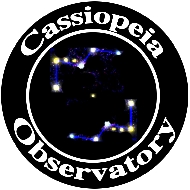More Geosynchronous Satellites;
NGC474 & NGC470 Galaxies
Posted: 17 October 2017
|
Open: Monday, 16 October 2017, 2046 MST Temperature: 73°F |
Session: 1151 Conditions: Clear |
Equipment Used:
12" f/8 LX600 w/StarLock
2" 24mm UWA eyepiece
Focal Reducer
Camera:
D7200 DSLR
2054 MST: LX600 ON, StarLock OFF, High Precision OFF.
Viewed Neptune, 102X.
Began setting up to do more imaging of geosynchronous satellites (see the Sky & Telescope article "How to See and Photograph Geosynchronous Satellites". This is the setup of the D7200 DSLR on the observatory patio:

As on the previous session I focused on the star Vega using a Bahtinov Mask.
These untracked exposures are f/5.6, 3 minutes, ISO 3200, White Balance 3570K, FL 140mm. The stars are trailed. The fixed points of light are geosynchronous satellites. There are some trailed satellites visible as well.


2132 MST: returned to the observatory and began setting up to image NGC474 and NGC470 galaxies. First, slewed the 12" telescope to the star Hamal, mounted the D7200 DSLR at prime focus + focal reducer, and focused on Hamal using a Bahtinov Mask. Then slewed to NGC474.
2143 MST: StarLock ON. Did a 1 minute, ISO 6400, framing test exposure. It was OK. This is a StarLock autoguided, 5 minutes, ISO 6400, WB 3570K, exposure:

Mouseover or tap on image for labels
NGC474 and NGC470 are near the center, with several other galaxies visible in the image. Mouseover or tap on image for pointers to all the galaxies.
2201 MST: breezes had come up so ended imaging.
Removed the camera and viewed NGC474 and NGC470, 102X.
Viewed M45 (the Pleiades), 102X. Always a pretty sight.
2217 MSTL: LX600 OFF.
|
Close: Monday, 16 October 2017, 2227 MST Temperature: 71°F |
Session Length: 1h 41m Conditions: Clear, breezy |
Comments are welcome using Email. Twitter users can use the button below to tweet this report to their followers. Thanks.
Cassiopeia Observatory Home Page
Copyright ©2017 Michael L. Weasner / mweasner@me.com
URL = http://www.weasner.com/co/Reports/2017/10/17/index.html

